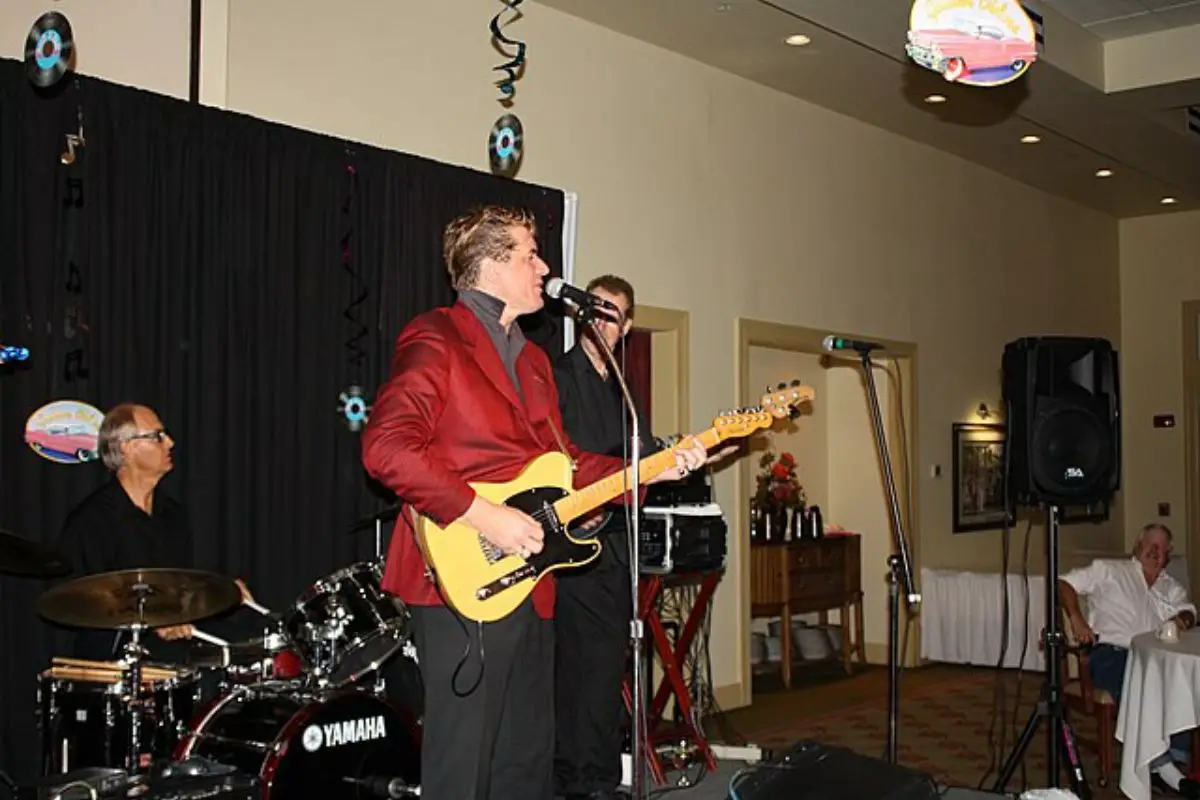Ready to rock? Ever wondered what a cover band is and how they make their mark in the music industry? Well, hold on tight because we’re about to unravel the secrets and stories behind these dynamic musical ensembles. Ready to join the party? Get ready to dive into the captivating world of cover bands!
What is a cover band? A cover band is a group of musicians that performs songs originally recorded by other artists, often adding their own twist to the music. They bring familiar tunes to life, giving audiences a chance to groove to their favorite hits in a fresh and exciting way.
How do cover bands select their material?
Cover bands perform well-known songs written and recorded by other artists (compared to “original” bands, which play the music they have written). There are many types of cover bands; some specialize in material from specific decades, such as an 80s cover band.

Cover bands have a diverse pool of musical interests and abilities, but how do they decide which songs to include in their performance repertoire? It all comes down to a collective meeting of the minds. Individual band members may already have a variety of popular songs under their belt, but they must come together to choose the ones that will stay on their setlist as a band.
Process of song selection
In the world of cover bands, it’s all about reaching a consensus. Bandmates bring their individual favorites to the table, showcasing their wide-ranging tastes. From there, discussions and negotiations take place to determine which songs will make the cut. It’s like curating a personalized playlist that represents the band as a whole.
Genres and musical preferences
Cover bands often find their niche in specific genres of music, such as country, blues, classic rock, or Top 40. This specialization allows them to cater to specific audiences and create a unique identity. By honing their skills in a particular genre, cover bands can establish a recognizable brand and attract fans who are passionate about that style of music.
AKAI Professional MPK Mini MK3

AKAI Professional MPK Mini MK3
What distinguishes a cover band from a tribute band?
It’s time to set the record straight: cover bands and tribute bands are not the same. While both aim to recreate the music of established artists, cover bands have more freedom to add their own touch and interpretation. They strive to capture the essence of the original artists while infusing their own style, making each performance a blend of familiarity and originality.
Flexibility and personalization
Unlike tribute bands, cover bands have the flexibility to bring their own artistic flair to the music they perform. While they work hard to recreate the distinctive elements of the original songs, they are not obligated to create a note-for-note duplication. This allows cover bands to showcase their creativity and leave their own mark on the music, keeping audiences engaged and entertained.
Pop culture reference
You know, cover bands aren’t just about replicating songs; they can infuse them with their own style, just like Kendrick Lamar remixes a classic track. It’s all about adding that extra flavor and making the music their own while still paying homage to the original artists. That’s the magic of a cover band—taking something familiar and making it fresh.
How do cover bands kickstart aspiring musicians’ careers?
Cover bands play a pivotal role in the journey of many musicians, providing a platform for growth and development. Let’s explore how being a member of a cover band can pave the way for future success.
Perfecting skills before pursuing solo careers
Joining a cover band gives aspiring musicians the opportunity to hone their craft and strengthen their skills. It’s like a training ground where they can perfect their instruments or strengthen their voices before venturing into solo careers or original songwriting. The stage experience gained from performing with a cover band is invaluable, allowing musicians to gain confidence and refine their abilities.
Learning through cover band experience
Even legendary bands like The Beatles started their journey as cover bands. Before they conquered the world with their groundbreaking originals, they spent years in Germany performing raw versions of American pop hits in local bars and nightclubs.
This cover band experience played a crucial role in shaping their musical abilities and fostering their interest in songwriting. So, never underestimate the power of starting from a cover band—it can be the stepping stone to greatness.

Where do cover bands usually perform?
Cover bands are the life of the party, but where can you expect to catch their electrifying performances? Let’s take a look at their typical venues and the impact they have.
Local and regional venues: Bars and small nightclubs
Cover bands are the heartbeat of local and regional music scenes. You’ll often find them rockin’ the stage in neighborhood bars and small nightclubs, bringing energy and entertainment to the crowd. These intimate venues allow for a close connection between the band and the audience, creating a vibrant atmosphere where everyone can let loose and have a great time.
Occasional opportunities to open for national acts
While cover bands primarily perform in local venues, there are exciting moments when they get a chance to open for national acts. It’s like a dream come true for many local cover bands to share the stage with their musical idols. These opportunities not only provide exposure but also inspire cover bands to push their boundaries and reach for greater heights.
Pop culture reference
Imagine the thrill and excitement of going from jamming in your garage to opening for Beyoncé at the Super Bowl halftime show. That’s the kind of leap cover bands can make when they get the opportunity to open for renowned artists. It’s a chance to showcase their talent to a wider audience and make a lasting impact.
Dos and don’ts for aspiring cover bands:
Aspiring cover bands should follow certain guidelines to succeed. They should have a diverse repertoire, practice regularly, and put their own twist on songs. Below are the dos and don’t for aspiring cover bands.
| DOs | DON’Ts |
|---|---|
| Choose a diverse repertoire | Avoid excessive imitation |
| Practice regularly | Steer clear of poor sound quality |
| Pay attention to arrangements | Don’t neglect stage presence |
| Engage with the audience | Avoid overplaying at local venues |
| Promote performances | Don’t overlook copyright laws |
| Maintain professionalism | Avoid conflicts within the band |
| Seek constructive feedback | Don’t neglect self-promotion |
Remember, these dos and don’ts are essential guidelines for aspiring cover bands. By following them, you’ll be on the right path to creating memorable performances and leaving your mark in the music world. Rock on!
What distinguishes a cover band from a wedding band?
Cover bands and wedding bands both bring live music to special events, but they have distinct differences. Let’s dive into the unique characteristics of each and understand what sets them apart.
Versatility in song selection: Cover bands
Cover bands have the flexibility to perform a wide range of songs from different genres and eras. They curate their setlists based on popular hits that resonate with their audience, delivering an energetic and engaging performance. The goal of a cover band is to entertain and captivate listeners with their musical prowess and ability to bring beloved songs to life.
Focus on specific occasions: Wedding bands
Wedding bands are specifically tailored to create a memorable experience for couples on their big day. They curate their song selection to cater to wedding ceremonies, receptions, and other wedding-related events. Wedding bands often perform a mix of popular love songs, dance hits, and timeless classics that add a touch of romance and celebration to the occasion.
Cover bands, like musical chameleons, adapt their repertoire to fit different occasions and cater to diverse musical tastes. On the other hand, wedding bands take center stage as the love song crooners, setting the perfect ambiance for one of life’s most significant moments.
Where are cover bands and wedding bands hired?
Let’s explore the venues and events where cover bands and wedding bands find their performance opportunities and how they contribute to the overall experience.
Cover bands in local festivals, private parties, and fundraisers
Cover bands often grace the stage at local festivals, private parties, and fundraisers. Their dynamic performances add energy and entertainment to these events, ensuring that attendees have a fantastic time. Their ability to perform a wide variety of songs makes them a popular choice to keep the party going and the crowd engaged.
Wedding bands in weddings and private events
Wedding bands, as the name suggests, are primarily hired to perform at weddings and private events. Their purpose is to create a magical atmosphere and provide unforgettable moments for the newlyweds and their guests. From the emotional first dance to the lively reception, wedding bands play a crucial role in making these occasions truly special.
Both cover bands and wedding bands have the power to create lasting memories for their audience. Whether it’s dancing the night away at a lively concert or sharing a heartfelt moment during a romantic wedding song, the music performed by these bands becomes intertwined with cherished memories. They contribute to the overall experience and leave a lasting impression on everyone involved.
What music genres do cover bands prefer?
Below is a table showcasing the music genres preferred by cover bands. It provides insights into the diverse musical landscape covered by these bands and their audience’s preferences.
| Genre | Percentage of Cover Bands |
|---|---|
| Rock | 45% |
| Pop | 25% |
| Country | 15% |
| R&B/Soul | 10% |
| Hip-Hop/Rap | 5% |
What are the advantages and disadvantages of joining a cover band?
Joining a cover band can be an exciting prospect for aspiring musicians, but like any career path, it has its advantages and disadvantages. Let’s explore both sides of the coin to help you make an informed decision.
Advantages of joining a cover band
Expanding musical repertoire
Joining a cover band allows you to broaden your musical repertoire and perform a wide range of songs across different genres.
- Gain experience in various music styles.
- Develop versatility as a musician.
- Expand your knowledge of different musical eras.
Building stage experience
Being part of a cover band gives you valuable stage experience, which is crucial for your growth as a performer.
- Develop confidence in front of an audience.
- Learn how to engage and interact with the crowd.
- Refine your stage presence and performance skills.
Disadvantages of joining a cover band
Limited Artistic Freedom
As a member of a cover band, you may face certain limitations when it comes to artistic freedom and expressing your own original ideas.
- Restricted to playing pre-existing songs.
- Limited room for experimentation and creativity.
- Difficulty in establishing a unique musical identity.
Constant Adaptation and Rehearsals
Cover bands require consistent rehearsals and the ability to adapt to different songs, styles, and band dynamics.
- Regular rehearsal schedules to maintain a tight performance.
- Continuously learning new songs and adapting to changes.
- Balancing personal commitments with band rehearsals and performances.
While joining a cover band can provide valuable experience and exposure, it’s important to weigh the pros and cons against your personal goals and aspirations. Consider how joining a cover band aligns with your artistic vision and long-term career objectives.
If you want even more great tips and information, check out the video.
H2: Frequently Asked Questions (FAQ)
Here are some commonly asked questions about cover bands, along with their answers, to provide further clarity on the topic.
Can cover bands perform original songs?
Cover bands typically focus on performing songs recorded by other artists and rarely delve into original material. Their main objective is to recreate popular songs and provide an entertaining experience for their audience.
Are cover bands obligated to sound exactly like the original artists?
While cover bands strive to capture the essence of the original artists, they are not obliged to create note-for-note duplications. Many cover bands add their own interpretation and style to the songs they perform, allowing for a unique and engaging experience.
Can cover bands adapt their setlists to cater to specific events or themes?
Yes, cover bands often customize their setlists to suit specific events, themes, or musical preferences. Whether it’s a wedding, a corporate function, or a themed party, cover bands can tailor their performances to meet specific requirements and create a memorable atmosphere.
Conclusion
Well, that’s a wrap on our journey through the world of cover bands. I hope you’ve enjoyed this rhythmic exploration and gained valuable insights into their role in the music industry. Remember, whether you’re jamming with a cover band, pursuing your own original music, or setting up a home recording studio, the key is to find your unique rhythm and let your passion shine through.
Let me know your question in the comments section below (I read and reply to every comment). If you found this article helpful, share it with a friend, and check out my full blog for more tips and tricks on cover bands. Thanks for reading, and keep the music playing!)
Key Takeaways
This article covered the fascinating world of cover bands, exploring their role in kickstarting music careers and providing entertainment at various events. Here are some key takeaways:
- Cover bands perform songs recorded by other artists, showcasing their versatility and ability to recreate popular hits.
- They offer aspiring musicians a platform to perfect their skills and gain stage experience before venturing into solo careers or original songwriting.
- Cover bands often specialize in specific music genres, catering to diverse audience preferences.
- They play a crucial role in events such as local festivals, private parties, and fundraisers, adding energy and entertainment.
- Joining a cover band provides opportunities to expand musical knowledge, develop versatility, and refine stage presence.
Helpful Resources















